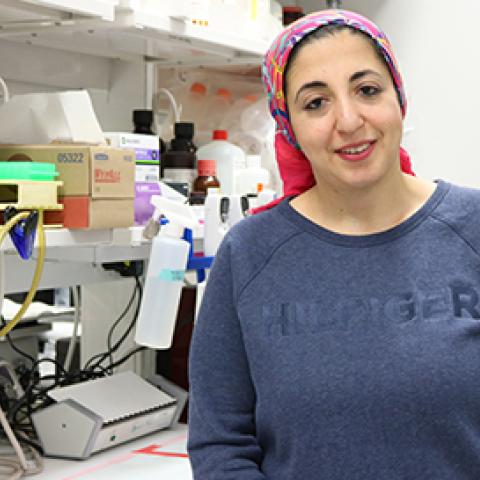
Dr. Labib next to her lab bench in Dr. Mock’s lab.
Photo credit: Lianne Priede
Rania Labib, Ph.D., is a postdoctoral fellow in the NIH African Postdoctoral Training Initiative (APTI) working in the lab of Beverly Mock, Ph.D., Deputy Chief of the Laboratory of Cancer Biology and Genetics (LCBG). The new postdoctoral training fellowship program is the result of a partnership between NIH, the African Academy of Sciences and the Bill and Melinda Gates Foundation under the auspices Coalition of African Research and Innovation. The program’s goal is to train fellows in high-priority global health research areas such as infectious diseases, maternal and child health and skill development for clinical and translational research while building bridges and lasting connections between the partner organizations and African scientists and institutions.
Dr. Labib came to NCI from Egypt where she headed the biorepository at Children’s Cancer Hospital Egypt. After hearing of APTI through an email from the International Agency for Research on Cancer, she felt that her dream of coming to NIH and NCI was finally in her grasp. As part of the fellowship, she will spend two years at NCI conducting initial experiments in Dr. Mock’s lab, where she hopes to make a difference in possible treatment options for children with Burkitt lymphoma. The two will work with a team in the Division of Cancer Epidemiology and Genetics to look at a variety of genetic and environmental factors associated with treatment outcomes from a large case-control cohort collected across three different countries in Africa. Dr. Labib will later return to Egypt to continue collaborating on experiments using samples from the Egyptian biobank to evaluate findings and applications of the work conducted at NCI.
Dr. Mock remarked that Dr. Labib’s training in pharmacokinetics and mechanisms of drug resistance brings unique perspective to their basic science group. She also says that everyone in the lab is already learning a tremendous amount from her. “During the first few days in the lab, my immediate lab members were impressed with her verve, enthusiasm and knowledge of clinical cancer and drug resistance, as were many others in our larger LCBG.”
When asked about the differences between working in the United States and in Egypt, Dr. Labib remarked that “the rate of work is totally different.” In just a month, she’s not only been able to complete required administrative paperwork, but also begin to design experiments and order necessary equipment.
She says the environment at NIH is “…very diverse, rich and collaborative.” In Egypt, people tend to compete rather than collaborate because of the limited resources. Of the research itself, she says that although research projects are planned meticulously, “[there is] space left for innovation to be driven [in a new direction] from the data that comes from the research.”
Dr. Labib is grateful for the new experiences that come with living in the United States. “It’s not just about the science and research but about culture,” she says. “Not just American culture but a diversity of culture. I think when I finish these two years, I will gain more insight into myself. The experience as a whole is very enriching to me.”
Post fellowship, Dr. Labib hopes to continue collaborating with the NCI and thinks there is potential for the working relationship to grow. She says, “What I have seen so far is a very productive and healthy environment.”
Learn more about the African Postdoc Training Initiative here.
Learn more about training opportunities within CCR here.